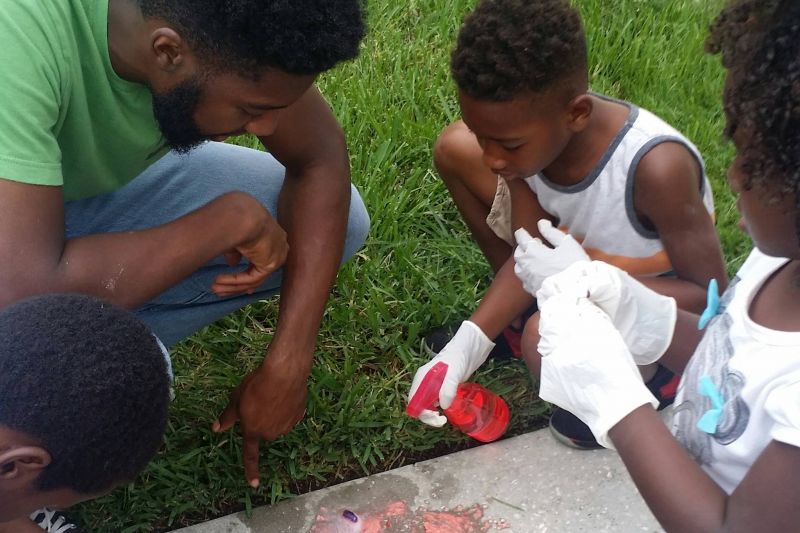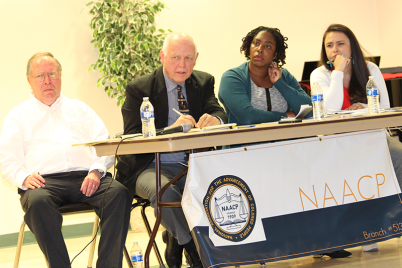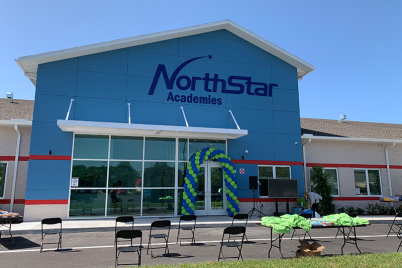Shaping the Early Mind, Inc. aims to level the playing field by providing early exposure to career possibilities in STEM. The nonprofit strives to inspire hope, provide direction, set goals, and look towards a brighter future together.
ST. PETERSBURG – Two science and tech educators are currently accepting youth participants for their first science competition and exhibition, “22 Innovative Ideas.” The nonprofit Shaping the Early Mind, founded by husband-and-wife team Marquis and Shai’Robia Davis, will hold the exhibition in collaboration with the Sankofa Science initiative on May 22, from noon to 4 p.m. on 22nd Street and 9th Avenue South.
The Davises started Shaping the Early Mind (STEM) in 2017 with the mission of providing access to, encouragement in, and engagement with technology education for all.
A PRIDE award-winning scholar in elementary school science who received the Juvenile Welfare Board’s H. Browning Spence Education Award, Shai’Robia Davis said that as a foster child she had gone to as many as 17 schools by the time she graduated high school.
Her experiences helped her understand the struggle of youth who may enjoy subjects like math and science but are not being given the support and encouragement to continue pursuing their passion for those subjects.
“I am a former foster youth, a Black woman, and I’ve just never been encouraged to pursue a career in science, even though that’s the subject I’ve always excelled in,” she shared.
Davis said after she had her first child, her penchant for researching health and science topics such as childhood vaccinations led her to ask herself why she wasn’t studying science — especially since she realized: “I could really see myself doing research, long term.” She returned to school, beginning to wonder “if other people aren’t pursuing these subjects because they’re facing some of the same challenges that I am.”
While working as a Career and Education Specialist for the nonprofit Ready for Life, Davis recalled that when asking countless Black youths what their plans were after high school, many of the males would respond: “Well, maybe I’ll play football, since I’m not good at basketball.” Davis wondered who told them that those were their only options.
Later, while considering an education degree at St. Petersburg College, Davis was completing required observation hours in a fifth-grade classroom. “Again, I’m asking kids, ‘What do you want to do, what do you want to be when you grow up?’” She remembered one child saying he would probably play basketball since he didn’t like football. But, when Davis asked him what his favorite subject was, he replied, “science.”
“So, you’ve never thought about a career in science?” Davis inquired. The child responded, “What do you mean?” Realizing the student had probably never thought of a career in science, she went home, did some research, and compiled a list of athletes who had degrees in various fields of study.
The next day she brought that list of names to the student, not convinced he would think much of it. But instead, “He took it, and he glued it in his take-home notebook, so he could keep it. Hopefully, that encouraged him to think about some other career,” she mused.

The 22 Innovative Ideas science competition and exhibition is open to youth residing in Pinellas County who meet at least one of the following criteria: be aged 6 to 14, identify as BIPOC, are in the foster care system, or have a permanent impairment.
While grades came easily to Davis, today she acknowledges that she’s not “a big school advocate.” Being a foster child meant not only a dizzying number of different schools but sometimes not attending school at all.
“I remember being out for like two months at a time, and I’d always come back and still be on track, excelling in my classes.”
Davis said she looks back at that time and wonders what they were teaching if she was one of the top students and not being in class for months at a time.
“So, I don’t feel like learning happens solely in the classroom.”
This belief and the desire to challenge the stereotypes people hold about what STEM educators look like are two more reasons the Davises started Shaping the Early Mind.
“What’s happening at home and in the community is also teaching the kids and making a huge impact on their lives as well — that’s why we want to bring the learning into their spaces and not just into the schools,” she noted.
Davis said both she and her husband, who has a degree in a technology field, have experienced “obstacles” and felt people’s skepticism when they meet them.
“When we walk in the room, we’ve both felt people [respond] like, ‘Oh, you’re here to do something else,’” Davis relayed. “We want to change the face of STEM for our kids so that they know ‘you belong here.’”
Currently employed as a complex specimen processor in a microbiology laboratory and pursuing a bachelor’s in Biomedical Science at the University of South Florida, Davis plans to take the Florida teacher’s certification exam. But she wants children to know that even without a high school diploma, they can participate in innovation.
“We want them to know — use your creativity, use your resources, and just go for it.”
STEM has done pop-up workshops in Campbell Park and currently are running a virtual stem program. They also shoot tech videos with youth and encourage parents of children interested in being featured in the tech videos to contact them.
The 22 Innovative Ideas science competition and exhibition is open to youth residing in Pinellas County who meet at least one of the following criteria: be aged 6 to 14, identify as BIPOC (Black, Indigenous, People of Color), are in the foster care system, or have a permanent impairment.
For more information, contact Sha’Robia and Marquis Davis at 727-685-6432 or email shapingtheearlymind@gmail.com. Follow them on Instagram and Facebook.
To reach J.A. Jones, email jjones@theweeklychallenger.com









